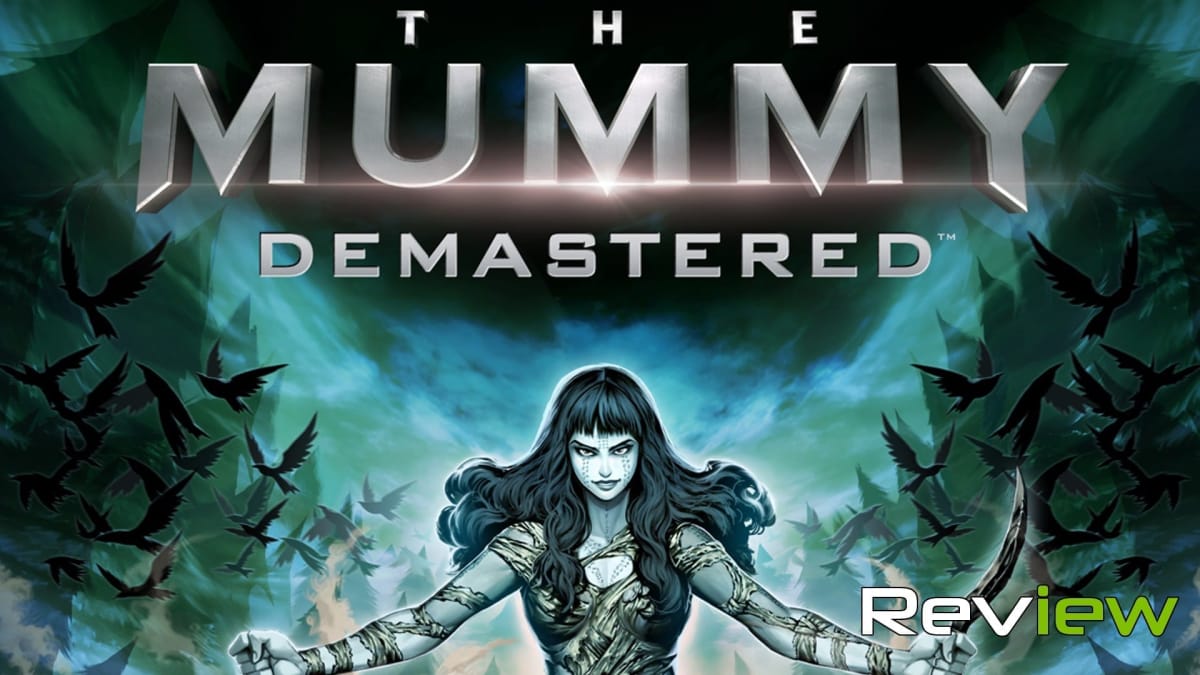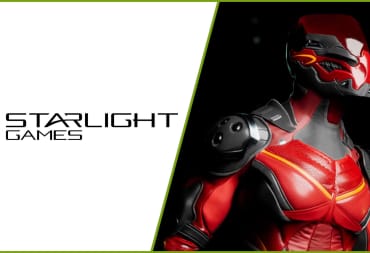Universal’s “Dark Universe” is just the latest in a slew of shared continuities between popular film franchises, following in the footsteps of modern day Marvel movies by producing action packed, B-movie style tales to sink your teeth into. The first movie in this franchise (2017's The Mummy) was not the best start to this canon, but some of the more interesting concepts, such as the paramilitary group Prodigium, do stand out as good hooks to the burgeoning franchise.
Likewise, you would expect some movie tie-in game to be released on mobile devices when The Mummy hit theaters, but surprisingly that didn’t happen. Instead, Universal took a different approach, hiring veteran Shantae developer WayForward and putting a bit of effort behind the game, loosely basing it on the same film. The result is The Mummy Demastered, a classic Metroidvania style action game that turns out to be a well crafted little romp that is sure to entertain for a few hours.
It was a strange choice by Universal to go for a small scale indie game to tie into The Mummy, but it was the right call in this case. Instead of a Tom Cruise look alike we get an anonymous agent from the Prodigium team, tasked to contain the resurrected mummy Princess Ahmanet and her legions of undead followers as she rampages through underground caverns, tombs, sewers, and London itself.
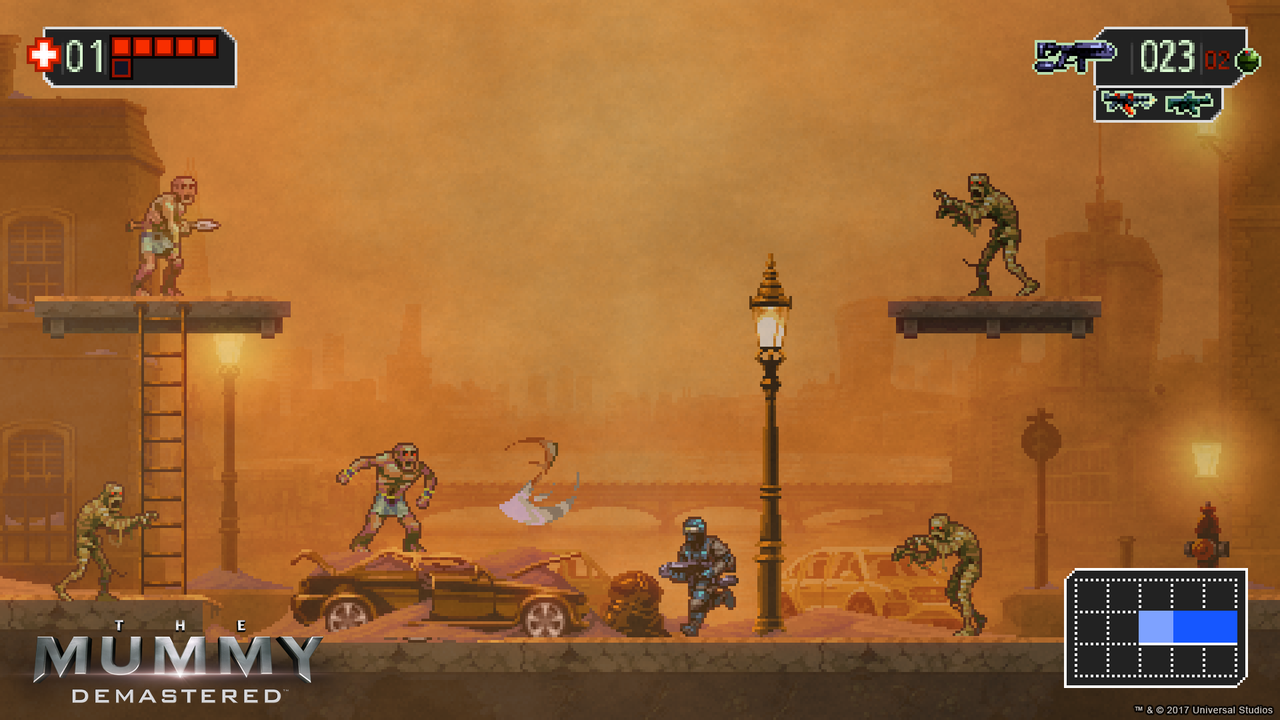
The world is crafted in the interconnected style we would see in a Metroidvania game, with tons of pathways, hidden rooms, and barricaded doors that are often just out of reach or in need of a new power-up to access. WayForward doesn’t deviate from the formula too heavily here, but they do lean on it by being too linear overall; reasons to backtrack include gaining additional power-ups, health and ammo increases but many of these are optional items to help you survive longer against the onslaught of enemies instead of being necessary to move forward.
It was kind of disappointing that most of the games structure is so constrained. Unlike classic titles such as Symphony of the Night, which encouraged exploration and backtracking by its design, the game simply made whole areas accessible in a linear fashion, creating a semblance of a connected world but were in truth, just cleverly hidden levels. The seven unique looking levels each have branching pathways to them though, so there is some fun in uncovering the whole map as you progress through The Mummy Demastered, but it is not encouraged to do so, especially in some parts of the map where the clear path forward is forced upon you.
All the combat is done through your handy weapons, which range from your default machine gun to shotguns, flamethrowers and even a rocket launcher as the game progresses. Outside of your default weapon, everything else consumes ammunition, which can be found by simply killing enemies or hidden points throughout the game world. You can also only carry two weapons at a time with your default, so selecting the right combination of weapons can make certain sections easier to get through than others, simply based on the strengths and weaknesses of your chosen firearm.
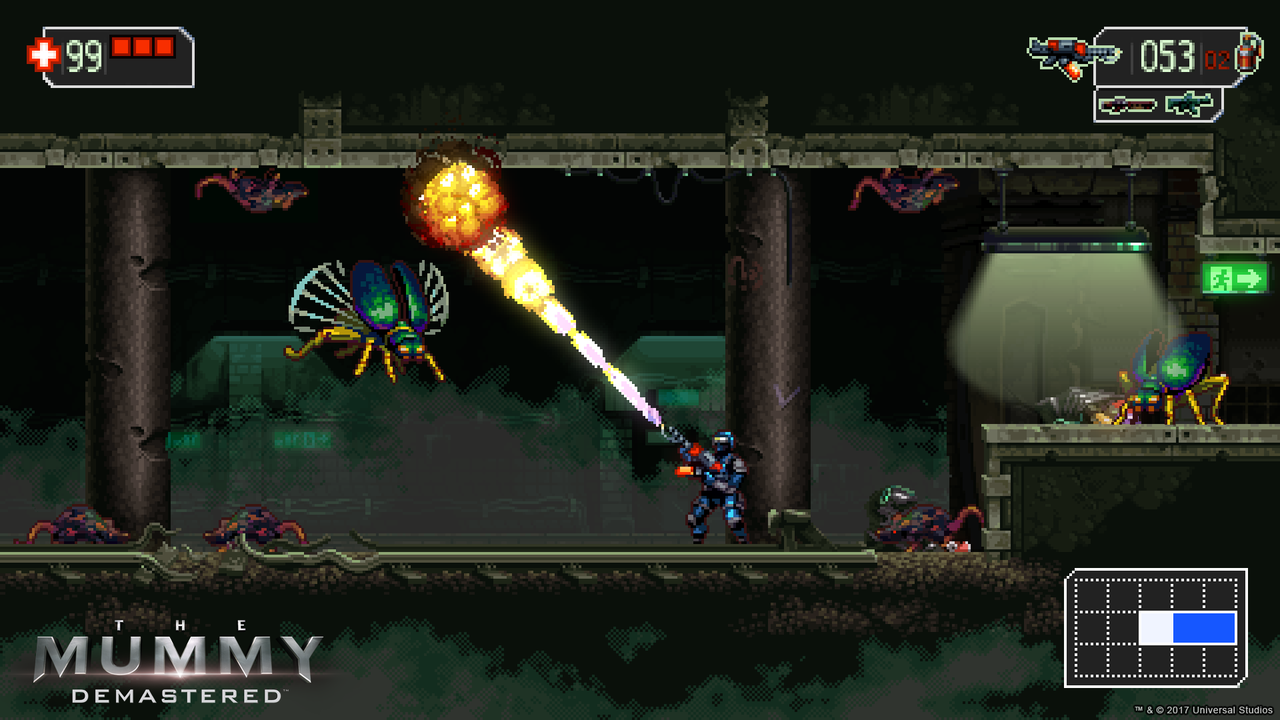
The powers are also what you would expect too; ability to climb walls, higher jumping skill, breathing underwater; there are no surprises here as many of them help in exploring every nook and cranny of the world to find hidden alcoves, collectible relics, or the optional power-ups. The simplicity of these abilities fits well with the anonymous Prodigium agent; you are essentially a nameless mook, an everyman sort of character that would be this kind of enemy in a lesser game. Gaining these power-ups begins to transform you into a more formidable hero, and in turn makes dealing with the growing threats around you easier.
The use of the anonymous protagonist is well done in The Mummy Demastered. One of those nice touches to the gameplay that plays with this idea is how death is handled in the game. Every time your agent dies, a new, fresh faced one takes his place. The previous agent, marked on the map where he fell, now roams the hallways and platforms like any other enemy becoming a new threat to contend with. What’s more, the fallen agent is the only way to recover all the collected weapons and power-ups you amassed in the game; so, seeking and destroying these fallen agents now has a purpose as well. It is one of the best design decisions in the game, creating a sense of foreboding at the powers Ahmanet has at her disposal.
The powers also make the game incredibly easy as time goes by. One power midway through the game made platforming go from a challenge to a joke, eliminating all the tension you needed for timed jumps and dodging enemies. The price you pay for becoming almost godlike yourself through The Mummy Demastered is the loss of difficulty, but WayForward cranks up the fun factor tenfold to compensate. A lot of that has to do with the level designs, you have the old standbys of caves, sewers and tombs of course, but a lot of bits stand out as being particularly exceptional. One section is a long climb up a massive clock tower, no doubt a nod of sorts to many a Castlevania game. We also get a destroyed London covered in sand, forested areas interconnected with maze-like caverns, and even a few underwater sections to traverse through.
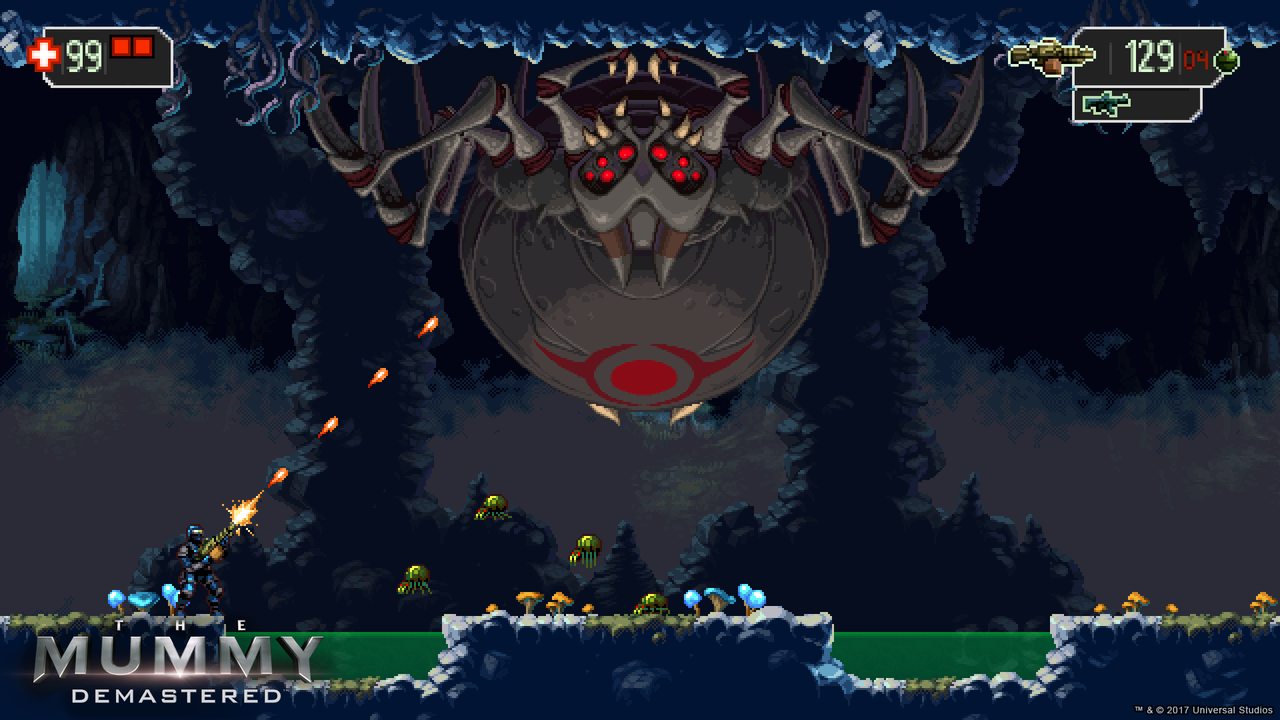
What makes these sections so good is how thought out they are; the platforming, enemy and power-up placement, the natural hazards, all of this is a massive plus to the games overall design, which is well done, if predictable in the end. Graphically the game captures the gorgeous, high quality sprite work we would see in a Neo Geo title such as Metal Slug; running smooth with fantastic chiptune music and sound effects accenting the whole experience. The hordes of enemies have a ton of variety to them; from giant locusts to bouncing brains, each of them follow patterns and have unique abilities on their own, and sometimes when combined it can lead to a chaotic mess that is simply fun to blast through with your superior firepower. Boss battles are also present in The Mummy Demastered, but all of them are easy to get through because of the very predictable patterns of attack they employ.
If there is one major complaint about The Mummy Demastered, it is how little of a challenge it is when compared to other games in the genre. Titles like Salt and Sanctuary, Axiom Verge and Guacamelee offer tougher fights through the game and arguably better progression in some cases. What’s more, the game is decidedly a throwback in terms of its content; whereas the games mentioned above play with the Metroidvania genre a bit by creating or tweaking established mechanics, The Mummy Demastered can be lifted straight out of the year 2000 in terms of its design. WayForward made it straightforward, which makes it fun, but nothing overly special to really grab a player’s attention from other titles.
Still, there is a lot worse out there than The Mummy Demastered. Fans of Metroidvania titles would enjoy the nice throwback experience the game gives you, even if it doesn’t stand out too much when compared to other games in the genre. Given its relatively short length though, The Mummy Demastered is the perfect kind of filler game between bigger titles; and one that is damn fun to play despite its few shortcomings.
Our The Mummy Demastered review was conducted on PC via Steam with a code provided by the publisher. It is also available on Xbox One, PlayStation 4, and Nintendo Switch.
Review Summary
Pros
- Excellent Design and Aesthetics...
- Classic Metroidvania Gameplay...
- Great Use of Power-ups and Themes...
Cons
- ...Too Linear at Times.
- ...Little Deviations to the Formula.
- ...that Make the Game Too Easy Towards the End.
Have a tip, or want to point out something we missed? Leave a Comment or e-mail us at tips@techraptor.net
